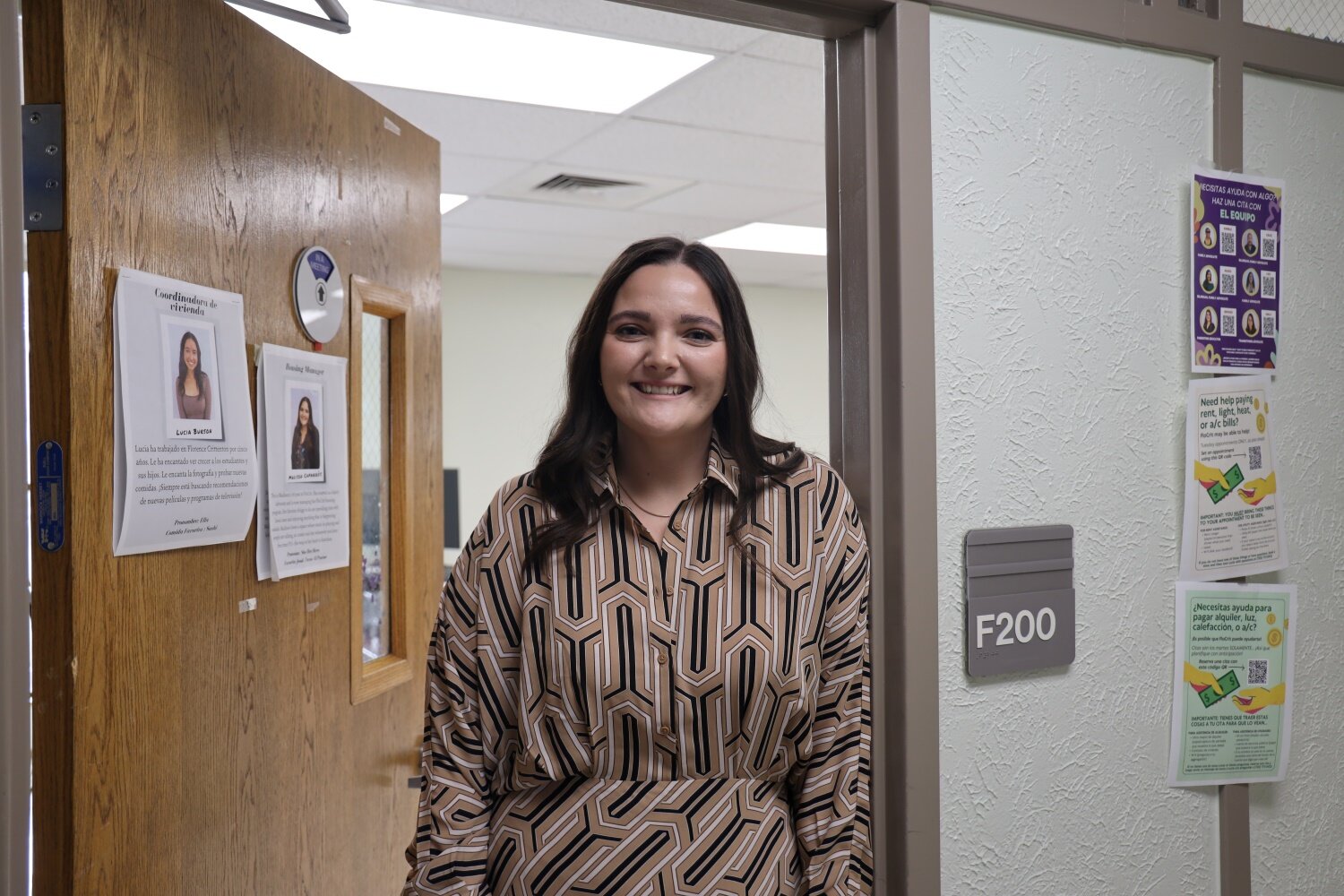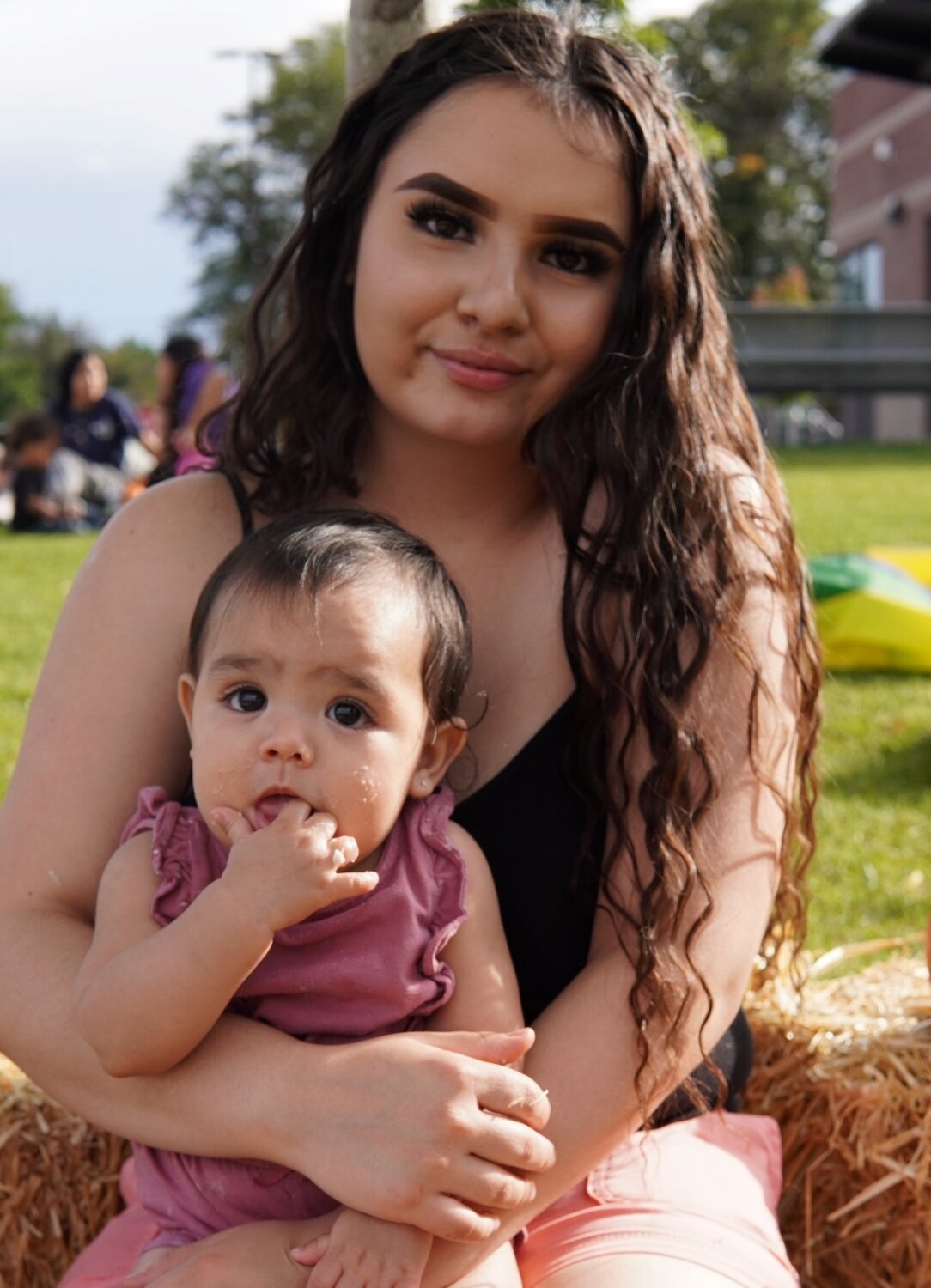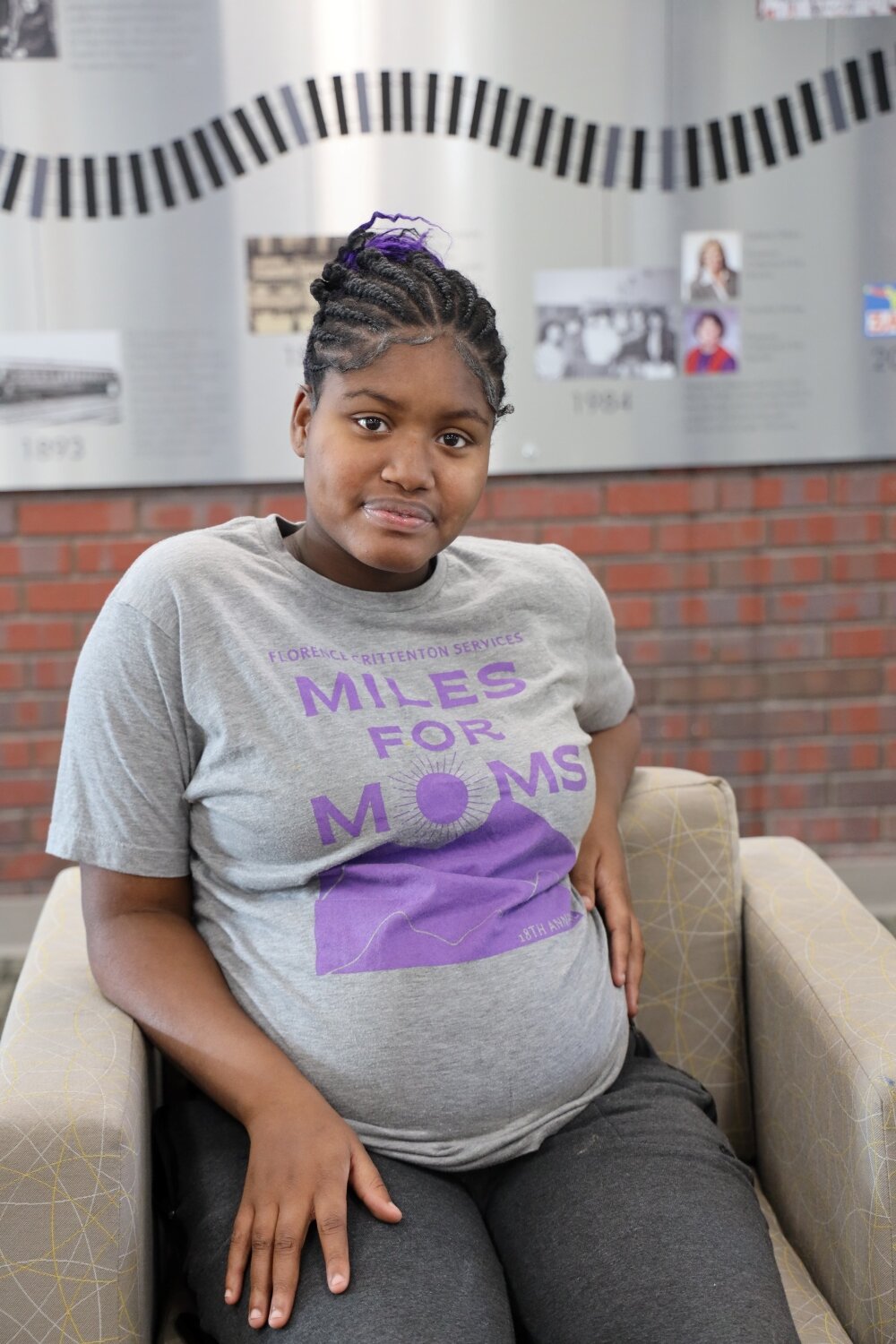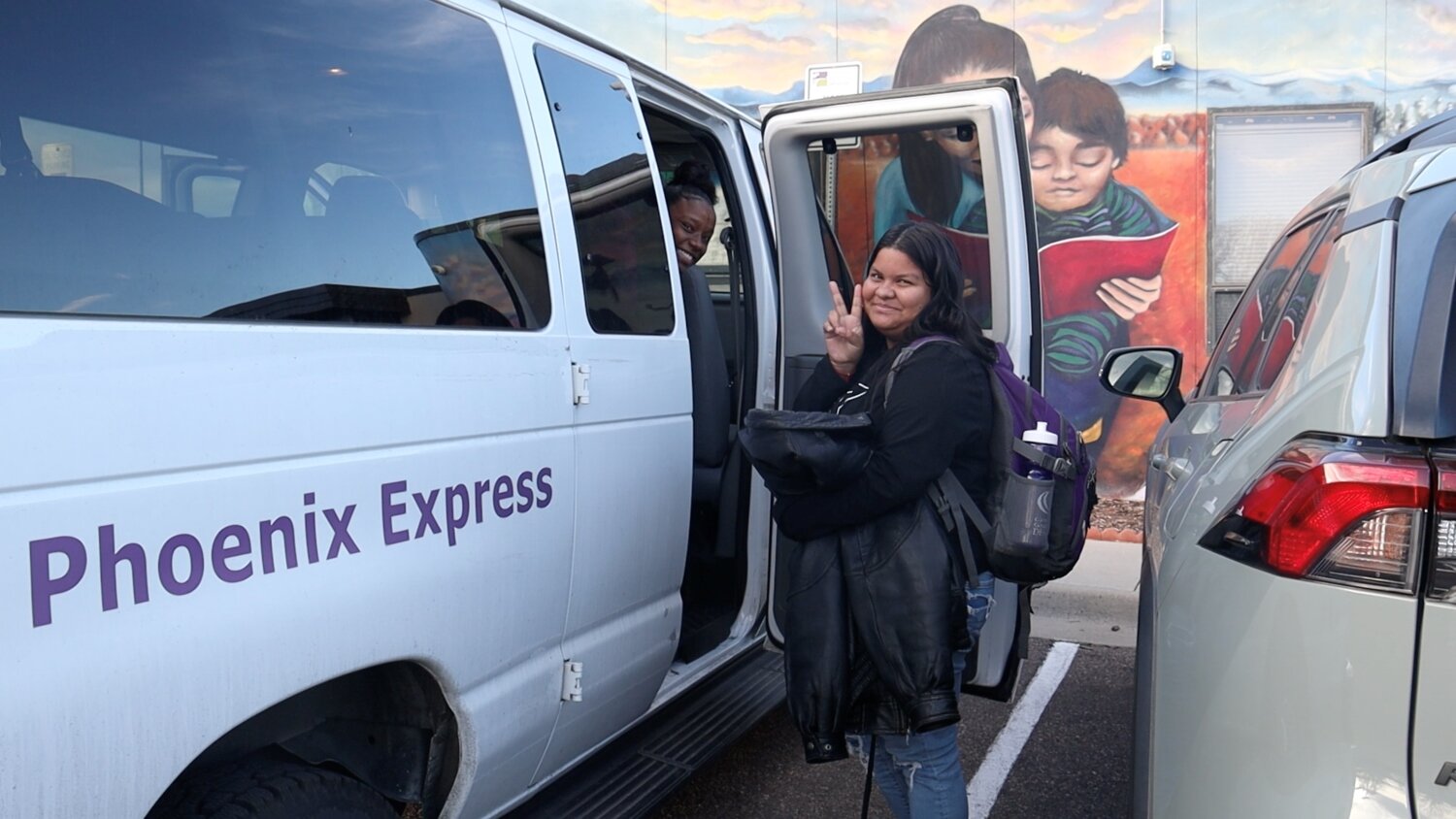Teen parents face unique housing challenges that create barriers to education

DENVER — It takes Rosa Caceres two vehicles and a little more than an hour to get to and from school, which is an improvement from the three-bus, two-hour commute she used to deal with.
Caceres lives in Aurora but attends Florence Crittenton High School in southwest Denver, on the opposite side of town. The commute is difficult, but to Caceres, it’s necessary.
Caceres is a senior in high school. She is also a mom to her 5-year-old son.
Florence Crittenton High School is a Denver Public School that partners with Florence Crittenton Services, a nonprofit organization providing resources and education to young mothers. The high school, often called FloCrit, is the only non-charter school in the Denver metro area with a curriculum and facilities designed with teen parents in mind.
“I feel like I can express myself without being discriminated against,” Caceres said. “At other schools, I feel like they would discriminate against me being a single mom or extremely young mother. But here, we're all the same, and there’s no discrimination against that.”
About 5% of Denver births were to teen parents in 2019, according to Denver’s Office of Children’s Affairs’ most recent report.
The FloCrit campus is designed to be a one-stop shop for pregnant and parenting youth, offering a daycare center, medical center, financial assistance and legal and housing services.
To access most of these resources, moms need to be able to get to campus in the first place. For students like Caceres, this can be a challenge. Even if the students can afford to go to class instead of work, they often face long commute times and unreliable transportation.
At the root of these transportation problems is the challenge to find stable, safe housing — and to be able to afford that housing while going to school.
“The biggest challenges to completing their education are housing and transportation, and usually those go hand in hand,” said Madison Caparros, the housing services manager at Florence Crittenton Services.
“As the cost of living has increased and most of our families are experiencing rent burden, they've had to move farther from the school,” Caparros said.
She said that housing programs and resources don’t often meet teen parents’ needs, causing them to fall through the cracks when it comes to accessing resources and support.

Housing services manager Madison Caparros has worked at Florence Crittenton Services for five years. Growing up with young parents herself, she’s always been passionate about helping young families.
Photo: Carly Rose, Rocky Mountain PBS
Vans, trains and automobiles
As housing in Denver becomes more expensive, many students find housing farther outside the city — and farther from the FloCrit campus.
Located in the Valverde neighborhood of southwest Denver, FloCrit served students from five counties and 33 zip codes last year.
“We still have a dense population of teen parents that live kind of within this area, but it's definitely changing,” Caparros said. “We have families where they're here coming to school, but they're about to be homeless. Sometimes the only unit we find that they can afford is all the way across the city.”
Caceres lives in Aurora, and she used to take three buses to get to campus. Caceres’ son has aged out of the early childhood education center on campus. But when he was still eligible, Caceres would have to make the long commute to campus with him in tow.
Now, Caceres uses the van offered by FloCrit — and driven by staff members like Caparros — to cut down her commute time and bus transfers.
“It's good because on a bus with a lot of people, [the kids] are very hyper and all over the place,” Caceres said. “It's really nice to be on just one transportation van. They feel like they can be more calm.”
The 12-passenger van currently serves 22 students and 17 children at three different stops and takes several trips to and from campus to accommodate everyone. Now that the van picks Caceres up at her bus station, her commute time has gone down from two hours to one.
A small Denver Public School bus can take students in the afternoon, but it can only transport passengers who can walk, Caparros said. This means students can’t ride the bus with their small children who haven’t yet learned how to walk.
Striving for housing stability
Of the 125 students at FloCrit, 99% reported experiencing housing instability.
This could mean they’re rent-burdened, live in overcrowded spaces, experience violence at home or lack access to public transportation. The U.S. Department of Housing and Urban Development considers someone rent-burdened if they spend more than 30% of their annual income on housing.
“[FloCrit] reached a point where we were like, ‘we don't have a choice,’” Caparros said. “We have to build something. We have to create resources for teen parents to have safe and affordable housing.”
FloCrit established its housing services team three years ago. Staff had been trying to help place students in shelters and safe housing before that, Caparros said. But with a formal housing program they can dedicate more time to guiding students through each step of finding a home, rather than just giving them a phone number to call.
FloCrit partners with Warren Village to provide transitional housing to teen moms aged 18 to 24 through a program called First Step. It costs students $50 a month to live there. Students typically stay at First Step for six months to a year, but they can renew if they remain within the age range, said Brooke Kimball, the parent educator at FloCrit.
First Step is one of the regular stops on the van’s route.
FloCrit sophomore Zarissa Mestas moved into First Step at the beginning of February with her 2-year-old daughter, Azariah.
As soon as Mestas turned 18 in December, the housing services team began working to get her into First Step. But before Mestas was eligible for that housing option, she said FloCrit helped her pay for motels, where she stayed with her mom and daughter.
Mestas said the housing services tried to place her in a Salvation Army shelter during that interim period, but she said she wasn’t eligible because she wasn’t living on the street or in her car. Mestas said she struggled to find other programs in Denver that could help her with housing.
“I was underage,” Mestas said. “Nowhere would help me cause I'm underage.”
Now, Mestas and her daughter are settled into First Step, where Mestas hopes she can get back on her feet and focus on school while she remains on the waitlist for a housing voucher.

Zarissa Mestas poses with her daughter, Azariah, in September 2022.
Photo: Nikki Arvidson, Florence Crittenton Services
The Denver Housing Authority supplies FloCrit with several housing choice vouchers and considers a student’s family size and income when setting a monthly budget for rent. Students must then find an apartment within that budget and are responsible for covering rent up to 30% of their income. The rest is covered by the voucher.
Kimball estimated about a dozen students and alumni are currently renting with a voucher. Staff at FloCrit help students apply for vouchers and tour apartments within their allotted budget.
Kimball said one of her favorite experiences as a housing coordinator was helping a student shop for furniture and kitchen supplies for her new apartment using money from FloCrit. The student had found a stable place to live, and Kimball got to help her make it her own.
“To watch them blossom once they get to a place where they can lay their head every night and know that they're safe and their child is safe is a really beautiful and special thing to be a part of,” Kimball said.
Ashaunna Amutter graduated from FloCrit last May. Amutter, 18, came to FloCrit’s housing services looking for a larger living space that still fit within her and her mom’s budget.
Amutter’s son turns five in April. She’s expecting her second child — another boy — that same month.
After a year of working with the housing services team, Amutter and her family moved into their new home at the end of last year. She wanted to stay in the area close to campus, but she said they ended up having to move farther away.
“I’m so excited. It’s what we’ve been asking for. It’s what we needed,” Amutter said. “With me finna have two kids, it’s a bigger space. I have my own space. My son has his own space. It feels like we’re so settled and able to do what we need to do and call this place as our home.”
After she and her mom were evicted, Mestas and her daughter stayed at a couple of friends’ homes — including in Greeley, which is more than an hour’s drive away from FloCrit’s campus — before staying in motels.
“It was hard to focus on school just because I felt so overwhelmed and stressed, I didn't know what to do. I just felt stuck,” Mestas said. “My main focus was trying to find housing or somewhere stable.”
Mestas said her daughter seemed crankier and threw more tantrums during that time. (Though her crankiness and tantrums may also be due to her being two years old.)

What housing resources are available for youth?
FloCrit’s housing services team serves moms aged 14 to 26. About 40% of the students at FloCrit are under 18 years old. Most of those minors are 16 or 17 years old, which is an age group that Caparros said can be especially vulnerable.
Caparros sees a lot of students from this age group who don’t have family support but are too young to qualify for the transitional housing or housing vouchers available to older students.
“We do have an overwhelming amount of 16- and 17-year-olds who are unaccompanied youth and have nowhere to go,” Caparros said. “They fit into this sector that just seems to be invisible with a lot of services.”
Caparros said there is one housing program in the Denver metro area, called Hope House, that offers emergency housing or “respite rooms” for 16- or 17-year-old moms and their children. It only has about a dozen rooms.
Youth homeless shelters
Urban Peak is the only shelter in Denver that serves minors. It’s licensed like a childcare facility so it can work with youth under 18 years old.
The organization has a pregnant and parenting program that helps connect young parents with case management, healthcare services, local childcare and housing resources. Urban Peak estimates about 20 parents use its programming.
Urban Peak’s CEO Christina Carlson said the organization works to get pregnant and parenting youth into housing as quickly as possible, but it’s not yet able to offer immediate shelter for both a parent and their child. The shelter’s drop-in center, which provides free services throughout the day, doesn’t offer childcare.
Current and former foster youth
For parents under 18 who are in the foster care system, Denver Human Services aims to place them in mutual care foster homes, which means they are in the same home as their child.
When foster youth, including teen parents in care, turn 18, they have the option to continue with the child welfare system. The Foster Youth in Transition program extends support and case management for foster youth until they turn 21, if they choose to opt in.
This includes the option for a supervised independent living placement, which is an apartment that the county helps the youth in care financially maintain. This could be a housing option for teen parents who are transitioning out of foster care.
An overwhelming need
The housing services team at FloCrit is a two-person operation, soon to be three, Caparros said. The team is not able to serve every student who requests housing assistance. However, for students facing emergency housing crises, like Mestas was, they prioritize getting them housed.
The program currently operates on a referral system, serving about 35 families, with about 20 students on the waitlist. “It's really hard to watch families continue to struggle with homelessness and housing instability,” Caparros said. “But we hope as we grow that we can continue to meet that need.”
Students may need to join a waitlist for the housing services at FloCrit, but registration for the high school and the organization’s general services are available for any interested young mother.
Registered students who lack stable housing can struggle to make it to school, Caparros said. These students need to prioritize working or figuring out where they’ll sleep that night.
Caparros said FloCrit recognizes that it can’t expect students to come to school when they don’t have a safe place to go home after the bell rings. The nonprofit works closely with DPS to advocate for students who are experiencing homelessness and explain their absences, she said.
While staying with friends in Greeley, Mestas said she had to take a break from school because getting to campus was too difficult. She said FloCrit made sure her absences were excused because the staff understood her situation.

Rosa Caceres rides the van driven by FloCrit staff to cut down her commute time. It still takes her more than an hour to get to her home in Aurora.
Photo: Carly Rose, Rocky Mountain PBS
Both FloCrit’s housing and transportation services are limited. But they are a first step in alleviating the housing and transportation challenges facing teen moms like Amutter, Mestas and Caceres, and removing the barriers those challenges pose to their education.
“I live very far, but it's just [having] the mentality of you can do it,” Caceres said. “If you think you can do it, then you can.”
This spring, Caceres will graduate from Florence Crittenton High School. Like most high school seniors, she’s excited and nervous about the transition. Her goal is to go to college and study medicine.
“Teen parents are even hungrier to have their own home and to complete their education, but they're usually working without an ounce of the resources that most other teens have,” Caparros said.
“They need extra support, and they need a safe place to learn and to have positive adult relationships from people that are going to teach them how to navigate the world.”
Carly Rose is the journalism intern at Rocky Mountain PBS. Carlyrose@rmpbs.org.
FloCrit alumna Ashaunna Amutter is preparing to welcome her second son in April. In her previous living situation, she said she found it difficult to parent her 5-year-old son. They lived in a tight space with older neighbors, and she felt like her son could not be himself.
Photo: Carly Rose, Rocky Mountain PBS.
“I know she did miss home,” Mestas said about her daughter. “She missed having a home and having a bed, having her own space. She's happy now. We moved into First Step. She seen her little bed, [and] she got all happy.”
Students also have access to a financial assistance program to help them keep housing once they find it. That includes a deposit for their first month’s rent and rent assistance to avoid eviction.
“Any time we have financial problems, we always get help with it,” Caceres said.
Caceres said she used FloCrit’s housing services program to explore her housing options.
She landed in stable but temporary housing in Aurora and is now focusing on finding longer-term housing solutions, Caparros said. One of those options might be the transitional housing at First Step, since Caceres is within the eligible age range.